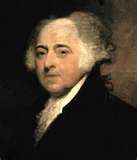If particular care and attention is not paid to the ladies, we are determined to foment a rebellion, and will not hold ourselves bound by any laws in which we have no voice, or representation.
Abigail Adams
Abigail always spoke her mind and got right to the point. She's been on my mind the last few days because of the serendipitous convergence of two separate events.
On the national scene, this is week of the Masters golf championship played at the Augusta National Golf Club...or should we say the epitome of the "old boys" club. Locally, here in South Florida, Women Executive Leadership held its regular book club meeting. WEL works to put more women on corporate boards and in executive positions.
So what's going on?
 The Augusta facts are fairly simple. The golf course opened in 1933. Women are not allowed to be members although they can play the course by invitation. The club excluded Blacks until 1990. IBM has been one of the major corporate sponsors for the Masters tournament at Augusta and the four previous CEOs were invited to join. Current CEO, Virginia M. Rometty, has not been invited.
The Augusta facts are fairly simple. The golf course opened in 1933. Women are not allowed to be members although they can play the course by invitation. The club excluded Blacks until 1990. IBM has been one of the major corporate sponsors for the Masters tournament at Augusta and the four previous CEOs were invited to join. Current CEO, Virginia M. Rometty, has not been invited.The WEL book club discussed Knowing Your Value: Women, Money, and Getting What You're Worth, by Mika Brzezinski, co-host of MSNBC's Morning Joe. Her book discusses the struggles of women, even those in top positions, to get paid what they are worth or at least comparable to men who hold the same positions.
When the women's movement re-emerged in the early 1960s many of us believed the days of sexism were numbered just like de jure segregation. But as Mika and Virginia and many of us have discovered, we still have a way to go (despite what the cigarette commercial told us.) Not asking for what we want has been a major stumbling block for women. In our book club discussions several women pointed out how they had overcome this barrier -- all very inspiring and great role models and path breakers.
But wait a minute...It's 2012. 2012. Not 1933 when no one saw any problem keeping women out of a club. Not 1957 when we first met June Cleaver being the perfect housewife/mom. No, it's 2012 and not only is it time to end the nonsense of unequal pay which hurts companies who say they embrace diversity and empowerment and engagement and...
But where are IBM and Virginia Rometty in all this? Can you imagine the same situation if Augusta still didn't admit Blacks and IBM showed up to sponsor the Masters with a Black CEO?
Let's go back to Abigail again for some more of her conventional wisdom:
Arbitrary power is like most other things which are very hard, very liable to be broken.
Here's where a little leadership could come in. What if the CEO and her board simply said, very politely and ladylike of course, "Sorry, guys. We won't sponsor an event at your discriminating club."
But if such a conversation took place, it hasn't come to light yet. IBM's 14-member Board which boasts 3 women including Rometty, has a wonderful opportunity to take some leadership here. It's not about whether Rometty would like to be a member or not personally. Reportedly she's not an avid golfer. This is about standing up and saying, "This is not the way we do things at IBM. We don't need to have our name associated with your troglodyte policy. We'll look for other events to sponsor that reflect our corporate culture."
In fact, IBM has two pointed statements on its website, taking this exact stance:
In fact, IBM has two pointed statements on its website, taking this exact stance:
Employee well-being and diversity
Employee well-being is incorporated in every aspect of IBM’s global business, from our strategic and business planning to our operations. IBM also has a longstanding commitment to diversity and considers it a competitive advantage in serving clients.
This strong foundation brings us to where we are today...This is the point where we can take best advantage of our differences — for innovation. Our diversity is a competitive advantage and consciously building diverse teams helps us drive the best results for our clients.
So now's the time for some leadership...from both men and women; the IBM Board and CEO, the Augusta membership, every woman who has yet to demand what she is worth, and every man or woman who has been complicit in keeping the biases alive.
Or we may just have ot invoke Abigail's rallying cry and...
* * * * * * * *
(c) Rebecca Staton-Reinstein, President, Advantage Leadership, Inc.
Author: Conventional Wisdom: How Today's Leaders Plan, Perform, and Progress Like the Founding Fathers











